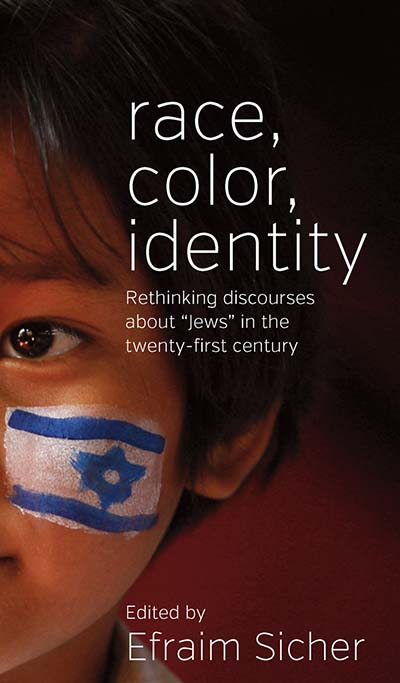Race, Color, Identity: Rethinking Discourses about ‘Jews’ in the Twenty-First CenturyPosted in Africa, Anthologies, Anthropology, Books, History, Judaism, Literary/Artistic Criticism, Media Archive, Religion, Social Science, United Kingdom, United States on 2013-07-19 00:38Z by Steven |
Race, Color, Identity: Rethinking Discourses about ‘Jews’ in the Twenty-First Century
Berghahn Books
May 2013
398 pages
bibliog., index
Hardback ISBN: 978-0-85745-892-6
eBook ISBN: 978-0-85745-893-3
Edited by:
Efraim Sicher, Professor of Comparative and English Literature
Ben-Gurion University of the Negev
Advances in genetics are renewing controversies over inherited characteristics, and the discourse around science and technological innovations has taken on racial overtones, such as attributing inherited physiological traits to certain ethnic groups or using DNA testing to determine biological links with ethnic ancestry. This book contributes to the discussion by opening up previously locked concepts of the relation between the terms color, race, and “Jews”, and by engaging with globalism, multiculturalism, hybridity, and diaspora. The contributors—leading scholars in anthropology, sociology, history, literature, and cultural studies—discuss how it is not merely a question of whether Jews are acknowledged to be interracial, but how to address academic and social discourses that continue to place Jews and others in a race/color category.
Contents
- Foreword / Sander Gilman
- Introduction: Rethinking Discourses about “Jews” / Efraim Sicher
- PART I: JEWS AND RACE IN AMERICA
- Chapter 1. “I’m not White – I’m Jewish”: The Racial Politics of American Jews / Cheryl Greenberg
- Chapter 2. Reflections on Black/Jewish Relations in the Age of Obama / Ibrahim Sundiata
- Chapter 3. Stains, Plots, and the Neighbor Thing: Jews, Blacks and Philip Roth’s Utopias / Adam Zachary Newton
- Chapter 4. Spaces of Ambivalence: Blacks and Jews in New York City / Catherine Rottenberg
- Chapter 5. African-American Culture, Anthropological Practices and the Jewish “Race” in Zora Neale Hurston’s Mules and Men / Dalit Alperovich
- Chapter 6. Jewish Characters in Weeds: Reinserting ‘Race’ into the Postmodern Discourse on American Jews / Hannah Adelman Komy Ofir and Shlomi Deloia
- PART II: JEWS AS BLACKS / BLACK JEWS
- Chapter 7. A Member of the Club? How Black Jews Negotiate Black Anti-Semitism and Jewish Racism / Bruce Haynes
- Chapter 8. Ethiopian Immigrants in Israel: The Discourses of Intrinsic and Extrinsic Racism / Steven Kaplan
- Chapter 9. Black-Jews in Academic and Institutional Discourse / Yonah Zianga
- Chapter 10. The “Descendants of David” of Madagascar: Crypto-Judaic identities in 21st century Africa / Edith Bruder
- PART III: DISCOURSES OF RACIAL AND ETHNIC IDENTITIES
- Chapter 11. After the Fact: “Jews” in Post-1945 German Physical Anthropology / Amos Morris-Reich
- Chapter 12. Genes as Jewish History?: Human Population Genetics in the Service of Historians / Noa Sophie Kohler and Dan Mishmar
- Chapter 13. Sarrazin and the Myth of the “Jewish Gene” / Klaus Hödl
- Chapter 14. Blood, Soul, Race, and Suffering: Full-Bodied Ethnography and Expressions of Jewish Belonging / Fran Markowitz
- Chapter 15. Jews, Muslims, European Identities: Multiculturalism and Anti-Semitism in Britain / Efraim Sicher
- Chapter 16. Brothers in Misery: Re-connecting Sociologies of Racism and Anti-Semitism / Glynis Cousin and Robert Fine
- Chapter 17. Race by the Grace of God: Race, Religion, and the Construction of “Jew” and “Arab” / Ivan Davidson Kalmar
- Select Bibliography
- Notes on Contributors
- Index
